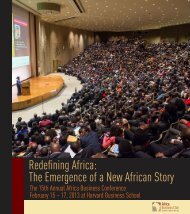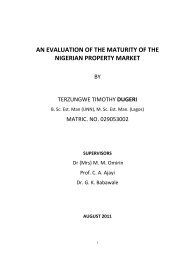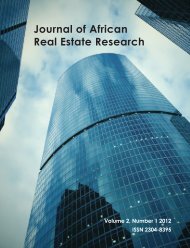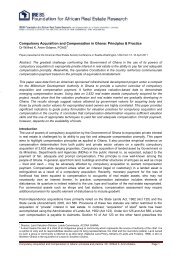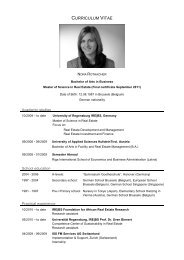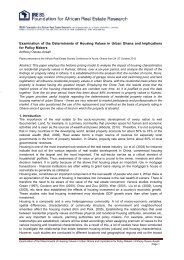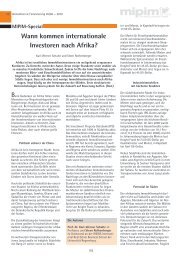Treaties and Bilateral AgreementsNamibia has ratified, acceded to, or is a member of varioustreaties and international agreements. In terms of article 144 ofthe Constitution of the Republic of Namibia, an internationalagreement binding upon Namibia forms part of Namibian law.Membership of International and Regional OrganisationsNamibia is a full member of a number of international andregional <strong>org</strong>anisations including: United Nations (UN) and itsagencies, International Monetary Fund (IMF), World Bank,World Trade Organisation (WTO), <strong>Africa</strong>n Union (AU), TheSouthern <strong>Africa</strong>n Development Community (SADC), Southern<strong>Africa</strong>n Customs Union (SACU), British Commonwealth ofNations and the Lomé Convention.Road and TransportNamibia has modern civil aviation facilities, an extensive, wellmaintainedland transportation network and an importantseaport at Walvis Bay. Construction continues to expand twomajor road arteries, the Trans-Caprivi and Trans-KalahariHighways, which will further open up the region’s access toWalvis Bay.WaterArticle 100 of the Namibian Constitution vests all naturalresources, including water, in the State. The control,conservation and use of water for domestic, agricultural, urbanand industrial purposes is regulated by statute. The NamibiaWater Corporation Limited (NamWater) is a State-ownedcompany dealing with bulk water supply and providing waterrelatedservices and facilities.EnergyDuring the pre-independence period, large areas of Namibia,including offshore, were leased for oil prospecting. Natural gaswas discovered in 1974 in the Kudu Field off the mouth of theOrange River. The field is thought to contain reserves of over 1.3trillion cubic feet. In 2009, the government announced changesto the ownership structure of the Kudu project. Tullow Oil Plc,which had owned 70% of the Kudu gas field, saw its stake drop to31%. Japanese firm ITOCHU Corporation, which owned 20% inthe project, now owns 15%. The Namibian Government throughstate petroleum firm the National Petroleum Corporation ofNamibia (NAMCOR) has partnered with the Russian firmGazprom to take a 54% stake in Kudu. NAMCOR, had previouslyheld a 10% interest. Plans are also under way to build thecountry’s first combined cycle power station near Oranjemund.With power shortages facing the Southern <strong>Africa</strong>n region, thegovernment has stated its commitment to develop the Kudu gasfield. However, the supply of electricity in the short to mediumterm remains a challenge.makes use of local broadcasting channels and wired and wirelessinternet connections. Telecom Namibia Limited is the nationaltelecommunications operator, established in August 1992 andwholly owned by the Government but functioning as acommercialised company.TourismNamibia generally attracts eco-tourists, with the majorityvisiting the Caprivi Strip, Fish River Canyon, Sossusvlei, theSkeleton Coast Park, Sesriem, Etosha Pan and the coastal townsof Swakopmund, Walvis Bay and Lüderitz. There are many lodgesand reserves to accommodate eco-tourists.MiningMining accounts for 8% of the GDP, but provides more than 50%of foreign exchange earnings. Rich alluvial diamond depositsmake Namibia a primary source for gem-quality diamonds.Namibia is the fourth-largest exporter of nonfuel minerals in<strong>Africa</strong>, one of the world’s largest uranium producers, and theproducer of large quantities of lead, zinc, tin, silver, andtungsten. The mining sector employs only about 3% of thepopulation.AgricultureAlthough Namibian agriculture, excluding fishing, contributedbetween 5% and 6% of Namibia’s GDP for the past five years,about 35-40% of the population depends on subsistenceagriculture for its livelihood. Animal products, live animals, andcrop exports constituted about 10.7% of total Namibian exports.The government encourages local sourcing of agricultureproducts. Retailers of fruits, vegetables, and other crop productsmust purchase 27.5% of their stock from local farmers.Labour RelationsEmployment relationships are regulated by the Labour Act(which applies to all employees, including foreign employees).Namibia has subscribed to various International LabourOrganisation (ILO) conventions. In terms of the NamibianConstitution, all persons have the right of freedom ofassociation, which includes the freedom to form and joinassociations or unions. No employee may be dismissed withouta valid and fair reason and without a fair procedure for dismissalbeing followed. It is also unfair to dismiss an employee becauseof such employee’s sex, race, colour, ethnic origin, religion, creedor social or economic status, political opinion or marital status.Foreign employees require a work visa if they intend to stay for ashort while in Namibia (about three to six months). It is usuallyvalid for three months and can be renewed a maximum of threetimes.Namibia has a well-developed legislative framework governingthe upstream and downstream oil business. Currently there areeight companies exploring for oil and gas.Namibia’s electricity grid currently supplies only about 40% of itspopulation. Electricity in Namibia is generated mainly bythermal and hydroelectric power plants.TelecommunicationsThe telecommunications industry in Namibia is regulated by theMinistry of Works, Transport and Telecommunication. Overall,Namibia has a good telephone and radio frequency system and59
NIGERJOHN FFOOKS & CO PROJECT FINANCE AND NATURALRESOURCES ADVISORY FIRMFirm InformationWebsite address: www.jwflegal.comLanguages spoken: English, Malagasy, FrenchContacts: John Ffooks and Richard GlassTelephone: +261 20 224 3247Fax: +261 20 224 3248Email: niger@jwflegal.comCountry InformationThe Hausa people extending across the Nigerian border form thelargest cultural group, accounting for more than half of Niger’spredominantly Islamic population of 16 468 886. The closelyrelated Sangria and Zarma (or Derma), concentrated along theNiger River, account for about a quarter of the population.Political SystemA President is elected for a 5-year term and a bicameral NationalAssembly with one 83-seat chamber is elected by popular votefor five years.Latest GDP Figures (2010 estimates)GDP:U$5.886 billionGDP per capita:US$604GDP (PPP):US$14.45 billionGDP per capita (PPP): US$760.945.Inflation Rate3,1% (2011 estimates).Investment ClimateThere are no local ownership requirements. Investors areencouraged to invest mainly in the well-developed miningsector. Coal and uranium are important. The Investment Codeprotects investors from expropriation of their assets if not in thepublic interest. There are investment opportunities in energyproduction, mineral exploration, agriculture, food processing,housing, construction, hotels and transportation.Forms of BusinessThe most popular forms of business for local and foreigninvestors are:A société anonyme (SA) which is a limited liability companyadministered by a board of directors or a shareholder. Theminimum share capital required is at least CFA 10 000 000(approx. US$20 000).A société à responsabilité limitée (SARL) which isadministered by one or more directors called ”gérants”. Theminimum share capital required is atl e a s tC F A1 000 000 (approx. US$2 000).Joint ventures are common in themining sector.60Formation of a CompanyThe procedures and estimated times to incorporate a companyare as follows:Notarize the company statutes (5 days);Deposit the initial capital in a bank and obtain a receipt(one day);Register company statutes (1 day);File documents with the Commercial Registry at the Greffedu Tribunal (RCCM) (2 days);Publish the company formation notice (1 day);Register with the tax authority representatives at RCCM (5days);Obtain confirmation that directors do not have criminalrecords (1 day).Register with the Caisse Nationale de Sécurité Sociale(CNSS) (1 day).Register with the Agence Nationale pour la Promotion del’Emploi (1 day).Exchange ControlsThe Exchange Code of the West <strong>Africa</strong>n Economic and MonetaryUnion (WAEMU/UEMOA) applies to Niger. There are norestrictions on payments and transfers. Niger’s currency is fullyconvertible into other currencies specified by the regulations.Dividends, interest, loans and fees are frequently transferred viaFrench banks.TaxationThe following taxes are required to be paid annually:Corporate income tax: 30%Social security tax: 15.4%Business license (fixed rate and proportional duty). Totaltax rate is 3.5 %.Apprenticeship tax: 2%Real estate tax: 1.5 %Capital gains tax: 15%Insurance tax: from 12% to 36%Tax on interest, if any: 15%Value Added Tax: 19%Stamp duty on contracts: CFA franc 1 500.Import/ExportFoodstuffs, machinery, vehicles and parts, petroleum andcereals are the major items imported by Niger. Niger is thesecond largest uranium producer in the world and exports of thismineral contribute about 40% of export revenues. Foreignexchange earnings from livestock are also significant. Japan,Nigeria and France are the three major export destinations forNiger’s products.Monetary PolicyMonetary policy is regulated by the Central Bank of West <strong>Africa</strong>nStates (BCEAO) and aims at preserving CFA franc-euro parity andcontrolling inflation. The monetary policies implemented in theregion follow those of the European Central Bank.Legal SystemNiger's legal system is based largely on French civil law. The HighCourt of Justice has jurisdiction to try the President andmembers of the Government for crimes or offences committedin performance of their official duties. Defendants andprosecutors may appeal judgments of lower courts, first to theCourt of Appeals and then to the Supreme Court, which is thehighest court of appeal. The Constitutional Court has jurisdictionover electoral matters, the constitutionality of laws andcompliance with international treaties and agreements.



